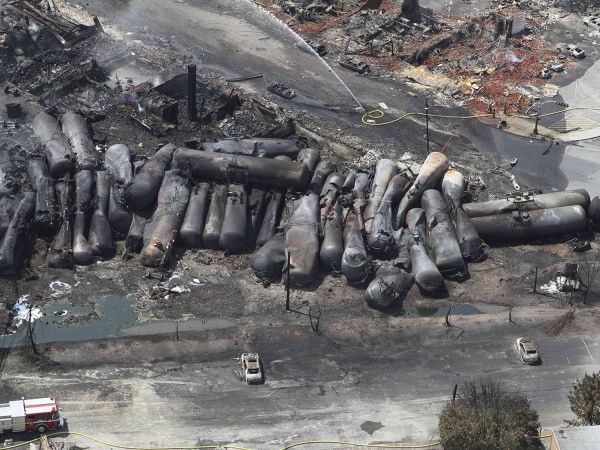Very interesting: 'Firefighters confirmed the Bakken crude oil involved in the early July train explosion in Lac-Mégantic, Quebec, reacted “in a way that was abnormal,” Ed Belkaloul, the Quebec head of the Transportation Safety Board, told... the Toronto Globe and Mail newspaper.' Investigators are now looking into how the oil was loaded onto the cars looking for anything that might have contributed to the "abnormal" explosion. Hopefully this, plus the FRA's emergency order prohibiting trains that transport hazardous materials be left unattended unless specifically authorized, will help those in charge to really scrutinize existing safety regulations and controls on our nation's rails.
Team investigating deadly oil train derailment comes to ND
BISMARCK — A team investigating the deadly oil train derailment and explosion in Canada was sent to a New Town oil terminal last week to see how the tanker cars were loaded.
By: TJ Jerke, Forum News Service, INFORUM
BISMARCK — A team investigating the deadly oil train derailment and explosion in Canada was sent to a New Town oil terminal last week to see how the tanker cars were loaded.
Firefighters confirmed the Bakken crude oil involved in the early July train explosion in Lac-Mégantic, Quebec, reacted “in a way that was abnormal,” Ed Belkaloul, the Quebec head of the Transportation Safety Board, told the Toronto Globe and Mail newspaper.
The train was carrying 72 cars with 50,000 barrels of crude oil from New Town to New Brunswick, Canada.
While the train was stopped in Quebec, parking brakes failed and the train rolled down a hill and derailed, crashing into the center of the small town. Within minutes of impact, the train erupted in flames, killing 47 people and demolishing more than 30 buildings.
Investigators from the Transportation Safety Board of Canada and U.S. National Transportation Safety Board spent a day looking at the New Town oil terminal and how the oil is transferred into the tank cars, according to Rox-anne D’aoust, communications manager for the Transportation Safety Board of Canada. She said they were looking for anything that could have contributed to the “abnormal” reaction.
A Securities and Exchange Commission filing by World Fuel Services, the fuel distributor that owned the oil at the time of the incident, indicates the oil was loaded at the Dakota Plains Co. facility just south of New Town.
A call to the facility’s owner was not returned Friday.
D’aoust did not know how many investigators visited the facility and could not provide information that came from the investigation.
A spokesman for the U.S. National Transportation Safety Board said he could not comment on the investigation, citing Canada’s lead role in handling the investigation.
Edward Burkhardt is chairman of the Montreal, Maine & Atlantic Railway, which operated the train that derailed. He told the Globe and Mail that the safety of shipping Bakken crude by rail should be reassessed.
“It looks like it was much more dangerous than we were predisposed to believe,” he said.
The railroad could not be reached for further comment Friday.
John Harju, associate director for research at the Energy & Environmental Research Center in Grand Forks, said the makeup of the Bakken oil shouldn’t make a difference in the investigation.
He said the lighter Bakken oil tends to be less viscous, or flows easier and may be more volatile than heavier crude oils, especially when exposed to heat. But he said it is less volatile than gasoline, ethanol and many other things routinely shipped via rail.
“I don’t think Bakken volatility is all that peculiar when it comes to a petroleum-related incident,” Harju said.
On Friday, the U.S. Department of Transportation’s Federal Railroad Administration issued an emergency order and safety advisory to help prevent trains from moving unintentionally. The announcement was made in response to the Canadian derailment as the railroad administration waits for additional data from the investigation.
Within the next 30 days, all railroads will have to comply with new measures that state no train transporting hazardous materials can be left unattended unless specifically authorized. A railroad company will be required to submit a process for securing unattended trains before receiving authorization.
Railroads will have to implement rules that ensure employees involved in securing trains participate in daily job briefings and ensure qualified employees inspect all equipment before the train is left unattended.
http://www.inforum.com/event/article/id/407999/group/News/

No comments:
Post a Comment